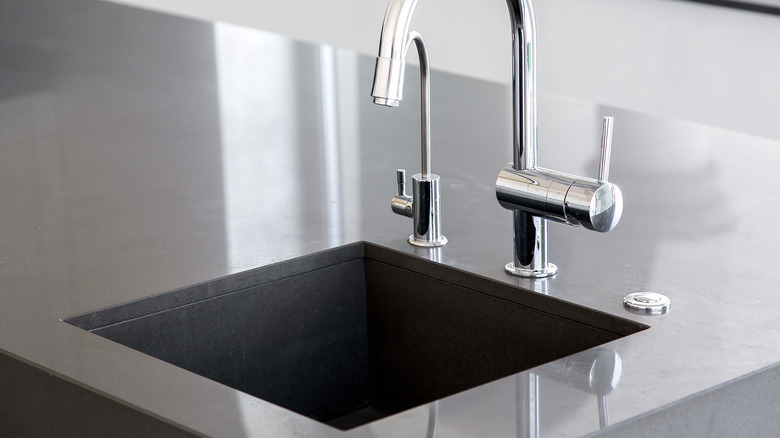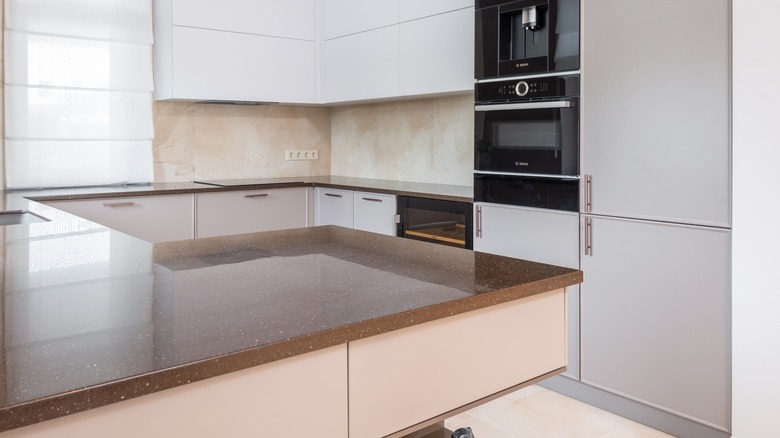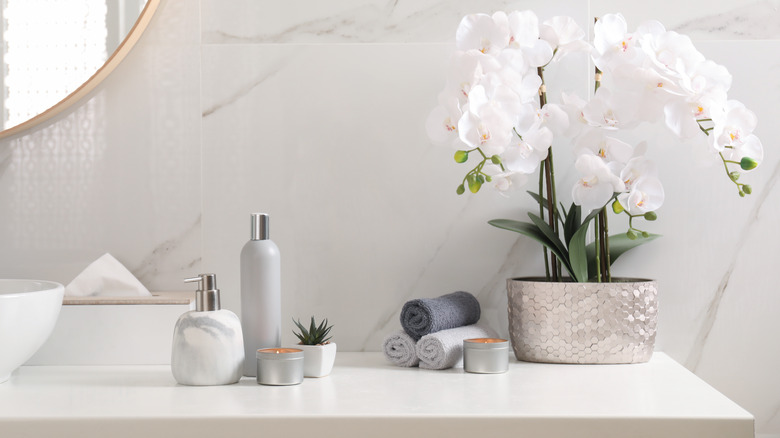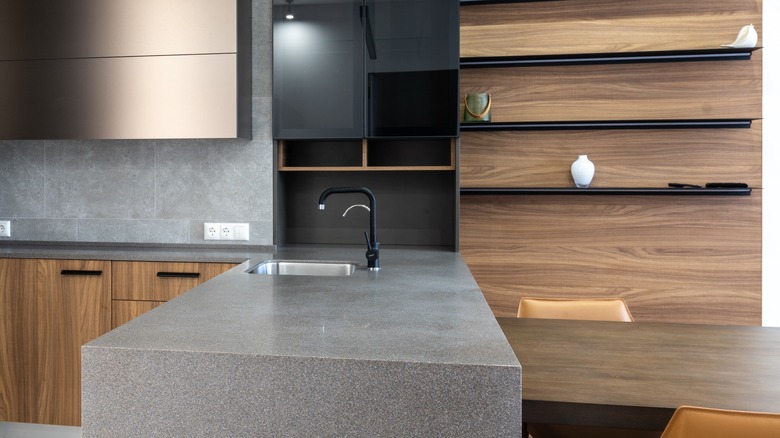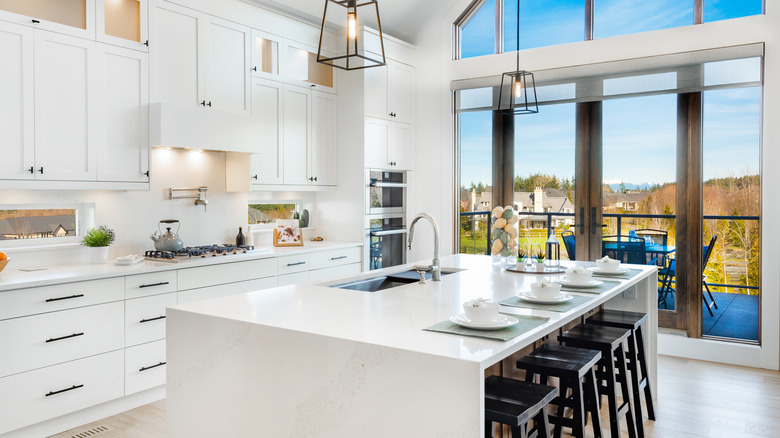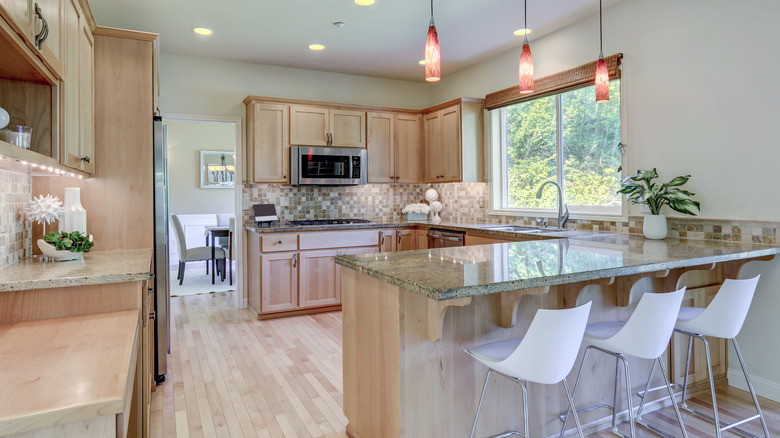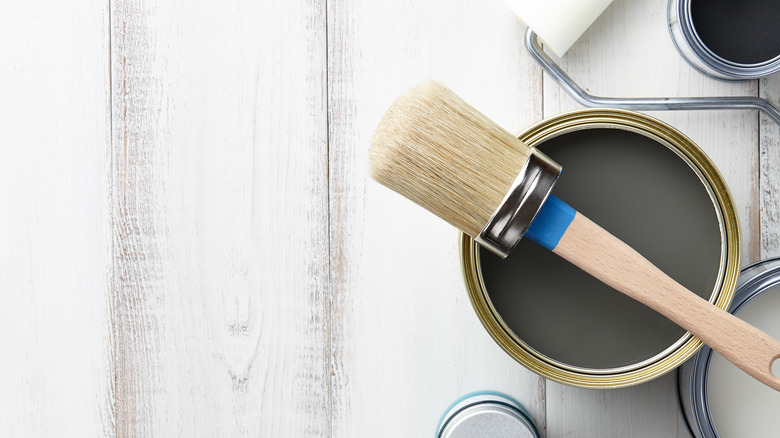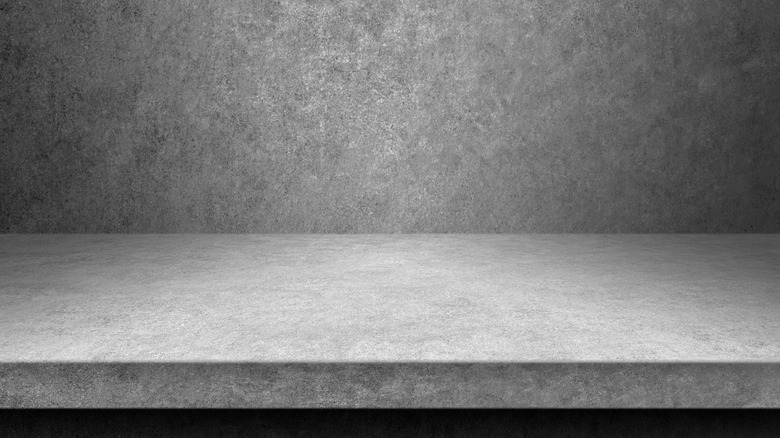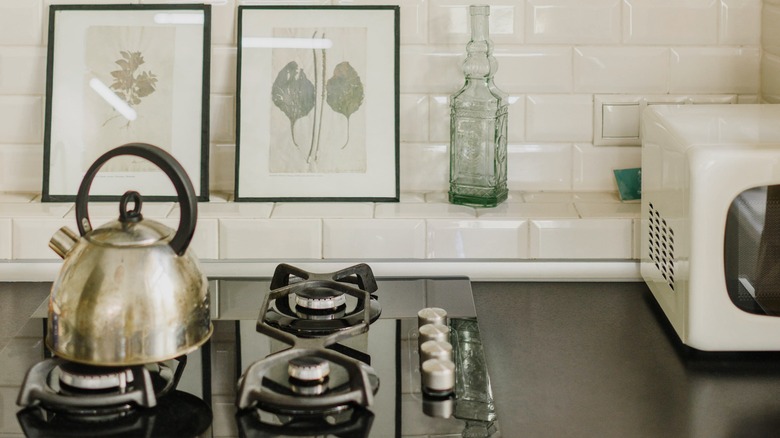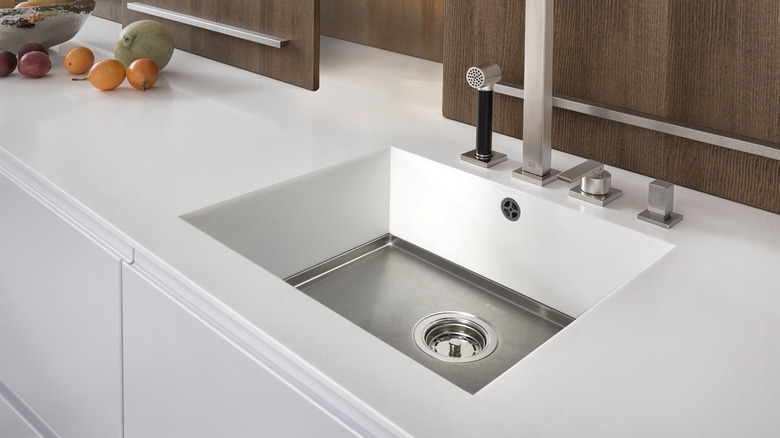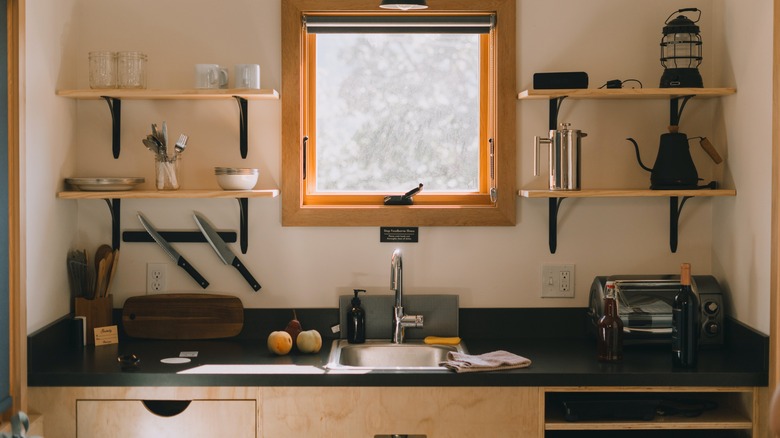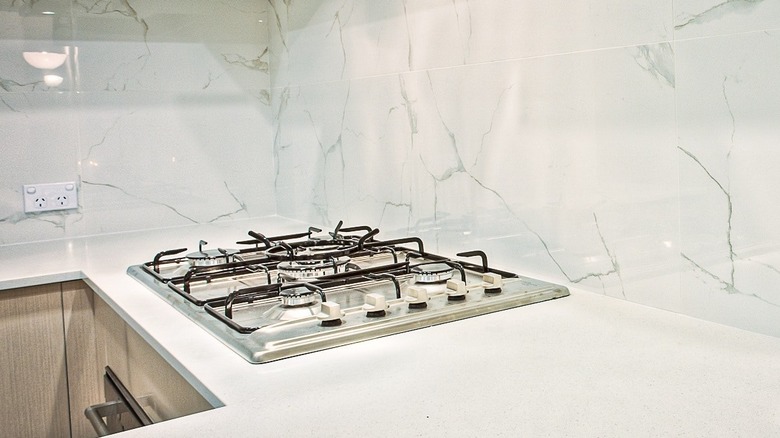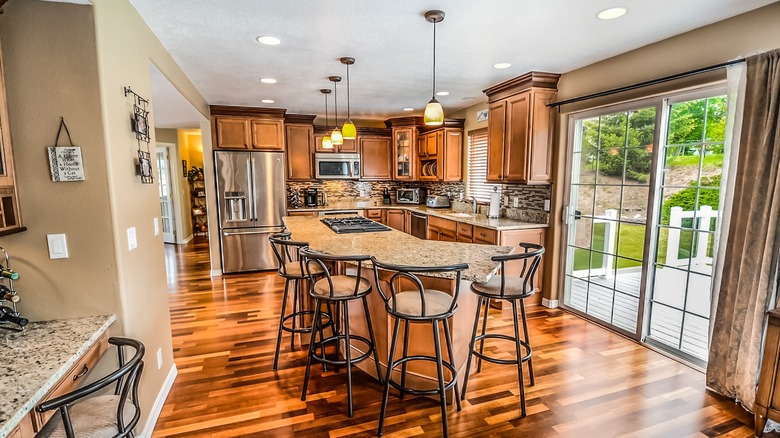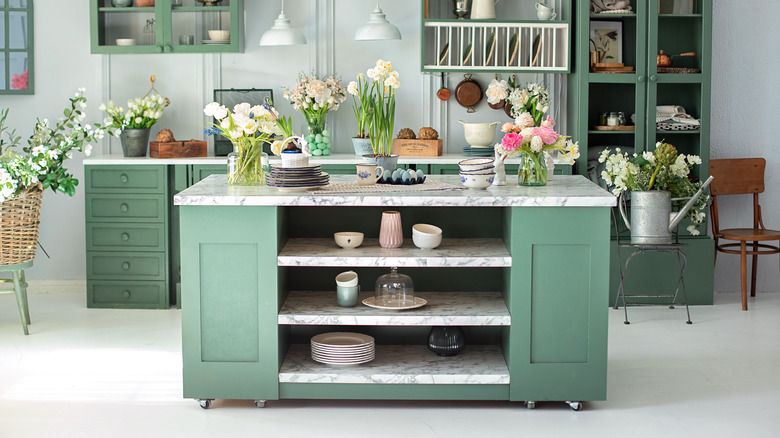What To Know Before You Buy Concrete Countertops
Kitchen remodels can be daunting. After all, the kitchen is one of the most functional spaces in the entire home, and the choices you make both in terms of layout and materials will have a lasting effect on how much you enjoy spending time in the space. While many homeowners gravitate towards quartz, granite, and marble countertops because of their popularity and durability, there's a lesser-known option that is perfect for homeowners who desire customizability and durability: concrete.
In the 1980s, the originator of the process of making concrete countertops, Buddy Rhodes, cast his first countertop. Shortly after, Fu-Tung Cheng continued the trend, according to Concrete Network. Since then, technology has advanced and styles have changed to give homeowners more options and stronger durability, as well as more affordable options.
Nowadays, concrete is among the most popular choices countertop materials, along with granite and quartz (via Countertop Advisor). The material is favored by professionals and homeowners who want full customization of their space. There is no limit to concrete because of the way it's poured and processed, allowing for a wider variety of shapes and forms.
Which options are available?
Concrete countertops are the most customizable options for homeowners. Because the countertops are poured instead of mined from slabs of rock, concrete countertops can be easily and inexpensively customized to homeowners' unique needs, styles, and spaces. While options like quartz and granite are bound to traditional slab layouts and sizes, concrete countertops can be artistically laid like an interactive sculpture and remain ergonomic while maintaining their design and structural integrity. Fu-Tung Cheng, founder and principal of Cheng Design, told Residential Products Online, "in the last 20 years with the evolution of concrete technology, we can pour thinner and actually spray concrete onto surfaces and make these beautiful concrete shapes that expand what you can do with it."
There are many types of concrete homeowners and contractors can use in a kitchen renovation. According to Caesar Stone, it's important to choose a concrete with a high pounds per square inch (PSI), which is a measurement of how hard the surface will be once it's cured. In the case of concrete countertops, you'll want a PSI of at least 6,000.
Concrete countertops also come in a variety of finishes. The most popular are polished, stained, and acid stain. Polished countertops compliment modern kitchens and can easily be repaired, while stained counters mimic granite or marble. To avoid expensive repairs, many homeowners opt for acid stain finishes, which don't fade or chip. However, acid stain concrete does not allow for as much pigment control as the other two options.
Maintenance required for concrete countertops
Concrete is just cement mixed with aggregates, such as rocks or sand. Because of the simple nature of concrete, it's easy to manipulate and customize, making it perfect for floors or countertops. However, because concrete is incredibly porous it requires a different level of maintenance than wood or granite.
All countertops, regardless of their material, should be sealed upon installation. The sealing helps create a stain-resistant and food-safe surface that can withstand heat and everyday wear and tear. Ghost Shield advises that homeowners should reseal their countertops once every six months to one year. Over time, sealers can become broken down by everyday use, abrasive cleaners, and general wear and tear, which can result in staining if something is spilled where the sealer has been worn away.
According to SFGate, concrete countertops need to be waxed monthly with a food-safe blend of beeswax, carnauba wax, and mineral oil. Additionally, homeowners should clean countertops with a mild, non-abrasive cleaner every day, and use soft cloths or sponges to wipe away any excess cleaning products. Concrete countertops also require a pH-neutral cleaner. It's recommended that homeowners use a mix of mild dish soap, which has a pH of 7 to 8, to clean their concrete countertops (via Homedit). There are also special cleaners on the market designed just for concrete countertops that don't penetrate sealers.
The installation process
According to Bob Vila, homeowners can DIY a concrete countertop with a few standard carpentry skills and some basic tools. If you decide to make your own concrete countertops, be sure to have a large enough work area and enough people to help carry and install the countertops. To DIY a countertop, you'll need to build a mold that matches the dimensions of your space using a melamine-coated particle board. Once the mold is built and reinforced, the next step is to add steel mesh to the mold, and then pour in the concrete, being sure to remove any air bubbles. The concrete will need to harden for a couple of weeks before the form can be removed and the concrete counter can be installed in the kitchen.
Installing the counters is the same process as any other counter, with the exception that concrete counters can weigh upwards of 100 pounds depending on the size and thickness. After the counters are placed, it's important to patch and fill any holes or cracks and seal the counter with an appropriate sealer.
If homeowners don't want to hire a professional or build custom molds themselves, they can also apply a concrete composite directly onto their existing counters. According to A Beautiful Mess, an Ardex-based mixture is a good DIY option. While this is less work than constructing new concrete counters, it's important to prep the counters carefully to ensure that the concrete coating adheres as it should.
Pros and cons of concrete countertops
Countertops are often a quick and easy change homeowners can make to their space, but they're also a very expensive one. Picking the wrong counter material for your lifestyle and decor style can not only cause a headache but be a costly replacement.
Homeowners often pick concrete countertops because of the ability to have different pigments, as well as stone, glass, ceramic, seashells, and other materials, embedded, according to Get The Edge. Because concrete countertops are usually above 6000 PSI, the surfaces are incredibly durable and, when taken care of, can last a lifetime. Additionally, concrete is heat-resistant and is very unlikely to be damaged by high temperatures (via HGTV).
According to Angi, because concrete countertops can be extremely heavy, often 19 to 25 pounds per square foot, cabinets and floors may require additional reinforcements. Concrete countertops can cost between $50 to $100 per square foot plus labor to be traditionally-installed, making them a more expensive option than quartz, which costs between $50 to $75 per square foot (via Forbes). Like other stone-based materials, concrete countertops are also prone to chipping and staining if they're not properly cared for or if the sealer starts to wear away.
Concrete countertops vs quartz
Quartz and concrete countertops usually go head-to-head when a homeowner is choosing materials for a kitchen remodel. The two materials are similar and can be mistaken for each other by the untrained eye.
Technology and new designs have made it hard to tell which is quartz and which is concrete. Both have a wide variety of colors and patterns available to homeowners and can mimic other counter materials, such as granite. Quartz and concrete are both extremely durable, quartz being one of the strongest minerals on Earth, according to International Granite & Stone.
According to Caesar Stone, homeowners tend to prefer quartz countertops because the installation process is quick, though it is best done by professionals. While concrete can be done by homeowners, it's best to leave the process of installing quartz to trained professionals because of the extreme precision and planning needed. Quartz is also a non-porous material, which means it doesn't require the same sealing as concrete countertops, which quickly absorb stains without proper regular sealing. Because of its nonporous nature, it's also a bit easier to clean quartz countertops.
On the other hand, concrete is able to be adjusted for any counter space, no matter how awkward. Quartz is only readily-available in slab cuts, and custom-built slabs can dramatically increase the cost of install (via Concrete Network).
Concrete countertops vs granite
Granite countertops are often considered to be the height of kitchen countertop luxury, while concrete is seen as a trendy fad amongst many designers. Both granite and concrete are stone materials that are susceptible to hairline cracks and basic wear and tear. However, according to Granite ASAP, granite is much less likely to crack when professionally installed. Granite also has a lower level or porosity than most natural stones, so although it does require regular sealing like concrete, it is less likely to stain without it. Granite ASAP recommends busy homeowners or homeowners with children consider granite over concrete because granite does not need to be waxed or resealed as often as concrete.
Both granite and concrete can withstand great heat without damage to the surface. Granite can withstand up to 480 degrees Fahrenheit, but it's not recommended to place hot pans on granite countertops that are sealed, because most sealers cannot withstand great heat (via Henry H Ross & Son Inc).
There is also a difference in cost between the two surfaces. According to Bob Vila, the average cost of granite countertops is around $3,250. Material cost alone for the granite and other supplies ranges from $40 to $60 per square foot, plus labor costs, which can be anywhere from $35 to $85 per hour. The cost for professionally-installed concrete counters, according to Angi, is $50 to $100 per square foot.
Types of sealer available
Because concrete is so porous, it needs to be maintained with a regular sealer. According to International Granite & Stone, an acrylic sealer needs to be applied once every six months to a year to block out moisture and stains. There are spray-on sealers available as well, which can last upwards of five years, but they require five days of curing time. In addition to acrylic and spray sealers, there are a wide variety of additional sealers on the market that are based around homeowners' lifestyles and how the counter is being maintained. According to Concrete Decor, penetrating sealers soak deep into the concrete and are practically invisible when dry. They make the concrete less porous and more resistant to moisture.
Counters using penetrating sealers can still stain when exposed to acidic liquids and substances. There are also firm-building sealers, many of which use a wax base to create a low-to-moderate sheen that repels liquid. Because the wax isn't very penetrative, it has to be reapplied regularly to be effective. Additionally, some homeowners may choose to use an epoxy formulation on their counters. Epoxies usually come in a two-component system that, when mixed together and then applied to the countertop, are extremely resistant to staining and chipping, but can only be applied using a UV light. They are also incredibly sensitive to heat, unlike penetrating sealers, and can melt on contact.
How to fix cracked concrete countertops
According to Interior, concrete countertops that are regularly maintained will last a lifetime. However, those that are neglected or improperly installed can develop hairline cracks. While many designers suggest having a concrete professional or contractor fix any cracks in concrete counters, homeowners can attempt to do it themselves. Epoxy is the easiest way to fix concrete countertops, and many hardware stores carry kits designed to be used on stone counters (via Hunker). However, when using epoxy to fix hairline cracks, it's important to match the epoxy to the countertop color, otherwise the crack can become more visible.
When fixing cracks in concrete, it's important to ensure that there is a liquid-proof barrier, otherwise the concrete can continue breaking and be susceptible to bacteria growth (via Reno Quotes). For deeper cracks that go through the countertop, the cement has to be drilled through every 6 inches and injected with an epoxy crack repair material. Afterwards it has to be set with a two-part setting epoxy and resealed (via Everything About Concrete).
Are concrete countertops good for resale?
According to The Spruce, concrete countertops can improve a home's resale value because concrete is considered to be a premium natural stone material. Real estate agent Joy Rasmussen installed concrete countertops in their kitchen and told Concrete Exchange, "We were able to list the house $20,000 over market value, and had no problems selling it. ... Concrete countertops are a unique offering to homebuyers who see the same finishes used in house after house they visit. Having concrete countertops almost gives you bragging rights — you have something different from your neighbors."
While upgrades like countertops can increase a home's value, how much depends on many factors, such as the size of the kitchen, the material of the countertops, and how difficult it would be to reinstall counters. According to Countertop Advisor, a general rule of thumb is that your new, professionally-installed countertops will increase the home's value approximately three times the price of the countertops.
A common mistake homeowners make
Many homeowners assume that concrete countertops are the same concrete composition as their floor or driveway. Although the concrete formulation can be similar, each location and purpose of the concrete requires a different level of care and attention.
According to Countertop Advisor, one of the first mistakes homeowners make when it comes to their concrete countertops is improper cleaning. Concrete is an incredibly porous material, and no sealer is resistant to all damage. If a homeowner uses common cleaners like bleach, vinegar, and lemon juice mixtures, they are going to cause damage to the integrity of their sealant.
Many homeowners who choose to take on the DIY project of installation often don't use the right material. Concrete for countertops is specially-formulated to reduce natural shrinkage and bubbling, and has a 6,000 PSI (via Quikrete). Another common mistake is doing a sloppy job during the laying of the concrete or the sealing. It's very easy to treat concrete countertops like other concrete surfaces, such as sidewalks or floors. In sidewalks and floors, drips of sealer or unlevel surfaces are virtually unnoticeable. But with concrete counters, the surfaces are much closer and require more functionality and performance. Messy sealer application that wouldn't be seen on a floor is going to be both obvious and damaging to a countertop (via Concrete Decor).
How eco-friendly are concrete countertops?
According to the Godwin Company, because concrete is made from gravel, sand, and cement, it usually is an eco-friendly choice for homeowners. But the process of aggregating and delivery of concrete can be a source of pollution. If homeowners want to ensure the process is as green as possible, they should look for local concrete aggregating.
Homeowners also have the option to mix in recycled material such as paper, coal fly ash, and glass into their concrete. When everything is finished, these materials can make up as much as 75% of the formulation without damaging the integrity of the cured material. Many installers also have leftover cement and concrete that can be partially reused in countertop jobs. According to the Concrete Network, many contractors are moving over to eco-friendly mixes and using water-based products and models, which help make the process more green. It's also important for contractors and homeowners to use Earth-friendly sealers that are non-toxic and food-safe.
Homeowners might also consider installing Glass Fiber Reinforced Concrete (GFRC) instead of traditional concrete countertops. GFRC is a cement-based composite that has been reinforced with alkali-resistant glass fibers. These fibers act like steel but they add an impact strength the material (via The Concrete Counter Institute). However, steel-reinforced concrete is considered to be more green than glass fibers.
How hard is it to get rid of concrete countertops?
When concrete countertops are installed, they're considered high-end additions, both because of their high cost and how difficult it is to replace them. Because concrete is so heavy, contractors bolt or reinforce the counters to cabinets or floors. Taking off the counters can result in damage to existing surfaces and structures if not properly done.
Concrete is a surface that requires constant maintenance to keep looking new, and even then the material will still age and weather (via Houzz). Because of the maintenance required and likelihood of staining if maintenance is not performed, many homeowners with kids often paint their concrete countertops. Since the material is so porous, it's the perfect surface to use a paint kit on. Concrete countertops can be refinished with paint, just like any other surface, as long as it's prepped properly (via Milk Paint). If homeowners do paint their surface, it's important to note that they will still need to reapply sealer on a regular basis because paint has very little natural hardness to it.
How to hire a contractor
One of the biggest names in the concrete countertop world, Fu-Tung Cheng, founder and principal of Cheng Design, recommends that homeowners with no experience use a trained professional. But he doesn't want to discourage people from learning the craft, even telling Residential Products Online, "If you can't afford Caesarstone and all the other materials out there, or you don't like the look, explore making concrete surfaces yourself. It's fun and you can start out really modestly by making a slab for a bathroom vanity countertop and graduate to a kitchen."
If homeowners choose to hire a professional, it's important to find a professional that has experience with concrete. ESub recommends homeowners should ask for recommendations, either from friends and family, or at local hardware stores that can provide a list of reputable contractors in your area. Additionally, it's important to get everything spoken about in writing. It's also important to make sure contractors are licensed by a reputable state board and all project permits are filed.
HGTV's Mike Holmes notes, "It's also important to understand that good contractors are booked at least two to four months in advance. If you feel you can't wait, remember this: Bad contractors are always available right away — because they are not in demand, or worse, because they are more than willing to bump their current renovation in progress to get started on yours."
Are concrete countertops a good fit for you?
According to Countertop Investigator, concrete countertops are a popular option for homeowners because of their high resistance to heat and scratches. Because concrete is so durable, it's a great fit for almost every homeowner who can afford the investment. However, it may not be the best fit for homes with children or for homeowners who cannot keep up the maintenance.
Proper, regular maintenance is essential. The countertops require regular waxing and sealer reapplication, and harsh chemicals cannot be used to clean them. The durability and stain-resistance of concrete countertops depend heavily on the type of sealer that homeowners use. According to Country Living, even sealed concrete will stain. But there are very few countertops that do not require a high level of maintenance to prevent stains, scratching, or heat damage, including quartz and marble.
Concrete is also one of the highest-cost materials, and it may be out of many homeowners' budgets to have it professionally installed. Trueform sales director Matt Tighe told Brick Underground, that it's a good idea to estimate anywhere from $110 to $150 per square foot for the entire job, from template creation to pouring and sealing.
Does concrete match your interior design style?
"Fixer Upper" is credited with bringing back concrete countertops, especially in the farmhouse style (via Remodelaholic). Joanna Gaines told Today she loves concrete countertops for their "timeless, industrial feel." Gaines is not the only one. According to Great Pros, interior designers love concrete countertops for their versatility and ability to have either an industrial look or a softened look with additions to shapes, textures, and colors.
There isn't just one style that concrete countertops can complement. Because of their earthy tones and texture, it's a great way to bring in natural elements and complement natural woods in a space. The Spruce claims concrete countertops can be in any kitchen from modern to traditional. Homeowners can manipulate the color of concrete or use the natural-honed countertop to offset glossy backsplashes. The countertops can be softened with details to add in elegance to traditional style kitchens, especially when paired with bold colors or white cabinetry. Homeowners can also transform their laminate countertops into concrete with DIY kits or concrete composite (via Taryn Whiteaker).
